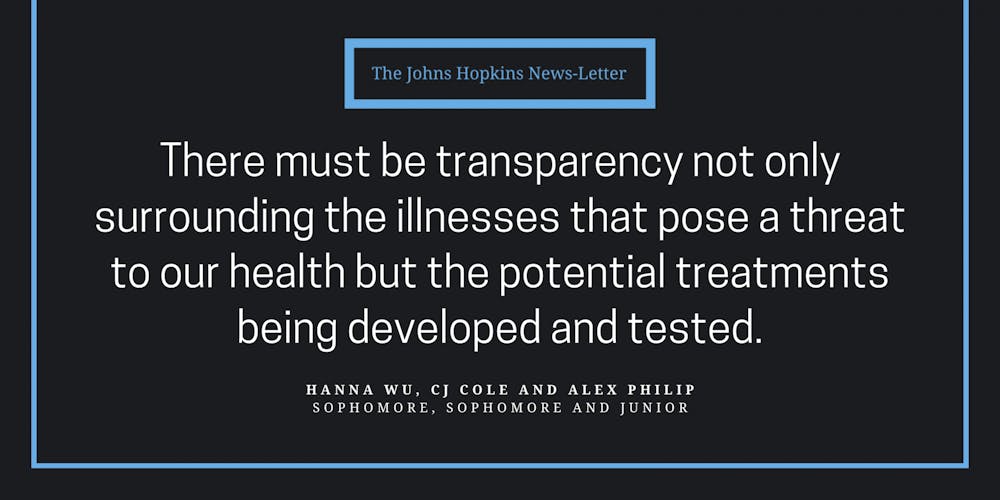Growing up, we thought the Food and Drug Administration (FDA) was the gold standard for drug regulation and new medical treatments. However, recently, we’ve realized otherwise.
Amid increasing distrust of scientific institutions, a 2021 study by the Harvard T.H. Chan School of Public Health found that, when it comes to public health, nearly half of Americans don’t trust institutions such as the FDA, the National Institutes of Health (NIH) and the Center for Disease Control and Prevention (CDC). While this study documented low levels of public trust in governmental health organizations during the pandemic, skepticism in the time of COVID-19 was influenced by preexisting distrust of public health recommendations.
The pandemic proved that, to earn citizens’ trust and effectively handle public health emergencies, the government needs to communicate openly with the public and improve transparency. There must be transparency surrounding not only the illnesses that pose a threat to our health but also the potential treatments being developed and tested.
Clinical trials are experiments designed to evaluate the efficacy of different medical treatments on individuals. Comprehensive and consistent reporting of clinical trials is critical for both patients and physicians to learn about the safety and efficacy of new drugs, preventative treatments, diagnostics and medical devices.
Trial sponsors have an obligation to submit applicable clinical trial results to the ClinicalTrials.gov database under Section 801 of the FDA Administration Amendments Act (FDAAA) of 2007. Failure to report, even when trials are unsuccessful, hurts patients and wastes the resources used in research, including taxpayer money.
Over the past few decades, clinical trials have become more complex and time-consuming. Reporting delays can further slow the approval of novel drugs and treatments, which is especially problematic if there are no other treatment options available. Under the FDAAA of 2007, the FDA and NIH are both responsible for the reinforcement of the reporting of clinical trials. Yet, they have not done this effectively.
Preliminary Notice of Noncompliance (Pre-Notice) Letters are supposed to warn noncompliant trial organizers to submit their trials within 30 days or face fines. However, thousands of clinical trials are currently overdue, and only 92 Pre-Notice Letters have been issued by the FDA since 2007.
So, why are we writing about this, and why should you care? Universities Allied for Essential Medicines (UAEM) is an international student organization advocating for equitable licensing practices and need-based, patient-focused innovation for university-created technologies. In other words, UAEM mobilizes students on campuses to be a part of the solution to the medical-access crisis. Timely reporting of clinical trials and transparent results are crucial for vaccine and drug development.
In response to the shortcomings of the FDA’s lack of enforcement, UAEM North America filed a citizen petition in February outlining three primary demands of the FDA. First, the petition demands that the FDA increase the number of issued Pre-Notice Letters to reflect the magnitude of trial data that remains overdue. The petition also urges that the FDA issue more Notices of Noncompliance and civil money penalties when appropriate. In fact, had the FDA been enforcing the regulations of the FDAAA of 2007 up to this point, the U.S. government could have imposed at least $45 billion in fines. Yet, the FDA has neglected to collect any.
Second, given the limited resources for enforcement, the petition has laid out a framework for the prioritization of enforcement efforts of clinical trial results, particularly those funded by taxpayer dollars through the NIH. Finally, the citizen petition demands that, in conjunction with the previous actions, Pre-Notice Letters filed by the FDA be made publicly available through the development of an online dashboard for increased accountability.
Clinical trial results need to be reported, and the FDA needs to take action to enforce clinical trial transparency. To keep the FDA accountable for complying with the FDAAA of 2007, on May 1, the UAEM chapter of Hopkins will make a trip to the FDA headquarters in Silver Spring, Maryland to rally for the enforcement of clinical-trial transparency. If you’d like to join us for this event or are interested in the work of UAEM at Hopkins, please email Hanna Wu, at wwu57@jhu.edu. Let’s keep the FDA accountable together.
Hanna Wu is a sophomore from Virginia Beach, Va. majoring in Anthropology and Medicine, Science and Humanities. Ciaran J. Cole is a sophomore from Appleton, Wis. majoring in Environmental Engineering. Alex Philip is a junior from Illinois majoring in Materials Science and Engineering. All are members of the Clinical Trials Transparency Committee of the Hopkins chapter of Universities Allied for Essential Medicines.





